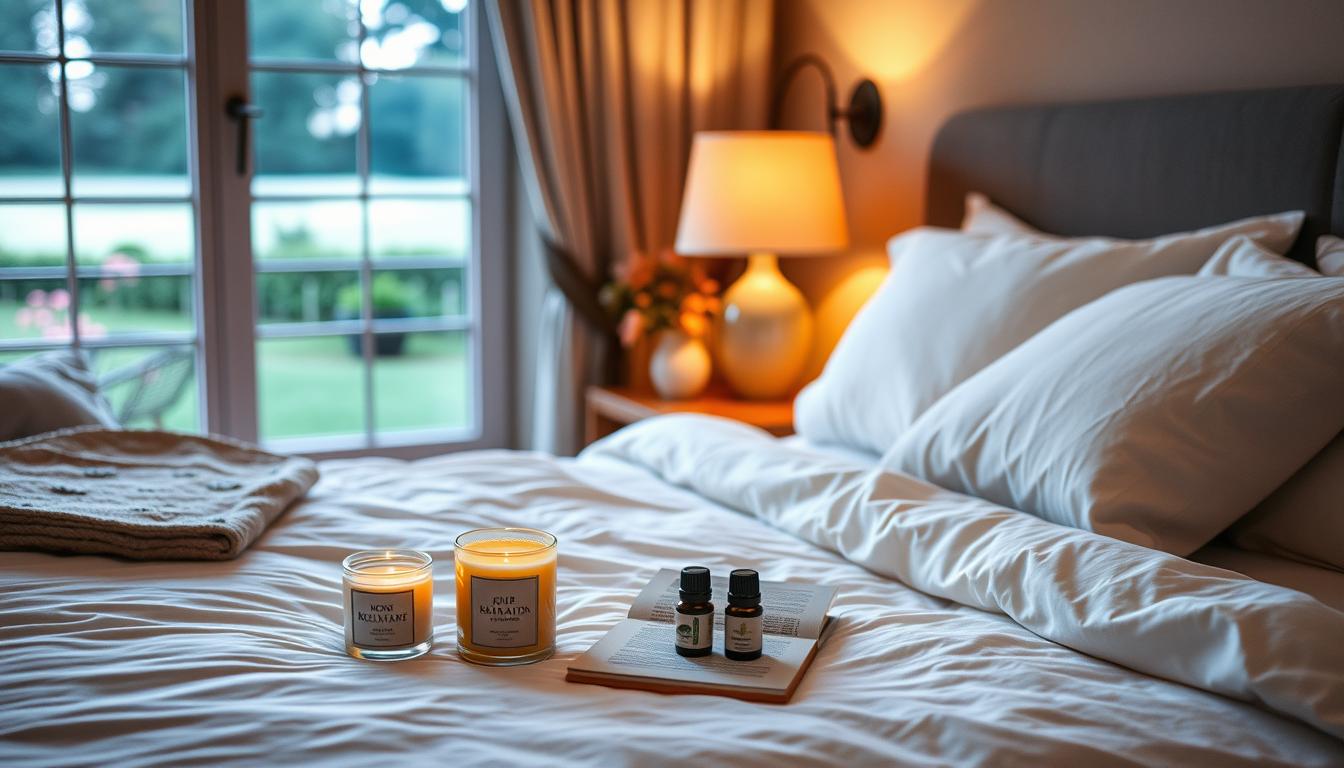
Achieving a perfect night’s sleep is crucial for maintaining optimal health and wellness. Quality rest isn’t just about closing your eyes; it’s about creating an environment and routine that supports deep, restorative sleep. Everyone deserves sweet dreams and good night a rejuvenating experience that helps them wake up feeling refreshed and energized.
Sleep plays a fundamental role in our physical and mental well-being. From supporting immune function to enhancing cognitive performance, the benefits of quality sleep extend far beyond simply feeling rested. Understanding the science and strategies behind achieving a great night’s sleep can transform your overall health and daily performance good night
In this comprehensive guide, we’ll explore proven techniques to help you create the ideal sleep environment, develop effective bedtime routines, and unlock the secrets to achieving truly restful and rejuvenating sleep good night
Key Takeaways
- Sleep is essential for physical and mental health
- Creating the right sleep environment matters
- Consistent bedtime routines improve sleep quality
- Understanding sleep science can help optimize rest
- Holistic approaches can enhance overall sleep experience
Understanding the Science Behind Quality Sleep good night
Sleep is a complex biological process that plays a crucial role in our overall health and well-being. To sleep well and achieve peaceful rest, understanding the underlying scientific mechanisms is essential. Our bodies go through intricate cycles and rhythms that determine the quality of our nightly recovery.
Exploring Sleep Cycles
Our sleep is not a uniform state but consists of multiple stages that repeat throughout the good night. These cycles typically include:
- Light Sleep Stage: Initial transition from wakefulness
- Deep Sleep Stage: Critical for physical restoration
- REM (Rapid Eye Movement) Stage: Essential for mental processing and memory consolidation
Circadian Rhythms: Your Internal Clock
The body’s internal clock, known as the circadian rhythm, regulates our sleep-wake cycle. This natural mechanism responds to light and darkness, signaling when to feel alert or sleepy. Disrupting these rhythms can significantly impact our ability to sleep well and maintain peaceful rest good night
Mental and Physical Health Connections
Sleep profoundly influences both mental and physical wellness. Adequate sleep supports:
- Cognitive function and memory consolidation
- Emotional regulation
- Immune system strength
- Cellular repair and regeneration
Quality sleep is not a luxury, but a fundamental requirement for optimal human performance.
By understanding these scientific principles, individuals can develop strategies to improve their sleep quality and overall health good night
Creating the Perfect Sleep Environment
Transforming your bedroom into a sanctuary for night’s rest requires careful attention to multiple elements. The right environment can significantly improve the quality of your sleep and help you wake up feeling refreshed and energized.
Key factors to consider when designing your ideal sleep space include:
- Room Temperature: Maintain a cool 60-67°F for optimal night’s rest good night
- Lighting: Use blackout curtains to block external light sources
- Noise Control: Implement white noise machines or soft earplugs
- Bedding Quality: Invest in breathable, comfortable mattresses and pillows
Temperature plays a crucial role in sleep quality. Your body naturally drops in temperature during sleep, so a cooler room helps trigger and maintain deeper rest cycles. Darkness signals your brain to produce melatonin, the sleep hormone, making blackout curtains an excellent investment for your night’s rest.
Noise management is equally important. Consistent background sounds like white noise can mask disruptive external noises, creating a more stable sleep environment. Consider soft, ambient sounds that promote relaxation without causing distraction.
Creating a good night space is about minimizing disruptions and maximizing comfort.
Selecting the right bedding can dramatically improve your sleep experience. Choose materials that regulate body temperature and provide adequate support for your body. Memory foam mattresses, cooling sheets, and ergonomic pillows can transform your bedroom into a sleep haven.
Essential Elements of a Peaceful Bedtime Routine
Crafting an effective bedtime routine is crucial for achieving quality sleep and maintaining overall wellness. A well-designed bedtime routine helps signal to your body that it’s time to wind down and prepare for rest.
Developing a consistent bedtime routine can transform your sleep experience. The key is to create a series of calming activities that help you transition from the day’s stress to a state of relaxation.
Calming Activities Before Bed
Selecting the right bedtime routine activities can significantly improve your sleep quality. Consider these relaxing options:
- Reading a light book good night
- Practicing gentle stretching
- Listening to soft music
- Journaling your thoughts
- Taking a warm bath
Optimal Timing for Sleep Preparation
Timing is critical in your bedtime routine. Experts recommend starting your wind-down process approximately 60-90 minutes before your intended sleep time.
| Time Frame | Recommended Activities |
|---|---|
| 90 minutes before bed | Begin relaxation activities |
| 60 minutes before bed | Minimize bright lights |
| 30 minutes before bed | Complete sleep preparation |
Digital Device Management
Blue light from digital devices can disrupt your natural sleep cycle. Implement these strategies to minimize digital interference:
- Enable blue light filters on devices
- Stop using screens 1 hour before bedtime
- Keep devices out of the bedroom
“A peaceful bedtime routine is the gateway to restful sleep and renewed energy.” – Sleep Wellness Institute
Your bedtime routine is a personal journey. Experiment with different activities and timings to discover what works best for your unique sleep needs.
Natural Ways to Enhance Your Night’s Rest
Creating a relaxing evening routine can significantly improve your sleep quality. Natural remedies offer gentle yet effective ways to prepare your body and mind for a restful night.
Aromatherapy stands out as a powerful tool for promoting relaxation. Essential oils like lavender, chamomile, and bergamot can transform your bedroom into a peaceful sanctuary. These natural extracts work by calming the nervous system and reducing stress levels.
- Lavender oil helps reduce anxiety and improve sleep quality
- Chamomile tea promotes muscle relaxation
- Bergamot essential oil can lower heart rate and blood pressure
Herbal remedies provide another excellent approach to enhancing your relaxing evening. Consider these natural sleep supporters:
| Herbal Remedy | Sleep Benefits |
|---|---|
| Valerian Root | Reduces time to fall asleep |
| Passionflower | Decreases anxiety and improves sleep quality |
| Magnolia Bark | Helps reduce stress and promotes relaxation |
Integrating gentle activities can further enhance your relaxing evening. Reading a book, practicing light stretching, or listening to soft music can signal to your body that it’s time to wind down. Creating a consistent pre-sleep ritual helps train your brain for better rest.
The key is finding what works best for your unique sleep needs and creating a personalized relaxation routine.
The Impact of Diet on Your Sleep Quality
Your diet plays a crucial role in achieving restful slumber. What you eat and when you eat can significantly influence the quality of your sleep. Understanding the connection between nutrition and nighttime rest can help you make smarter choices that promote better sleep.
Foods That Promote Better Sleep
Certain foods can naturally support your journey to restful slumber. Consider incorporating these sleep-friendly options into your evening routine:
- Almonds: Rich in magnesium, which helps relax muscles
- Kiwi: Contains serotonin that regulates sleep cycles
- Cherries: Natural source of melatonin
- Warm milk: Contains tryptophan that induces sleepiness
- Chamomile tea: Calms the nervous system
What to Avoid Before Bedtime
Some foods and drinks can disrupt your sleep patterns and prevent restful slumber. Minimize consumption of these items in the evening:
- Caffeine: Blocks sleep-inducing chemicals
- Alcohol: Disrupts REM sleep cycles
- Spicy foods: Can cause indigestion
- High-sugar snacks: Create energy spikes
- Large protein meals: Difficult to digest
Timing Your Last Meal
When you eat is just as important as what you eat. Experts recommend finishing your last substantial meal 2-3 hours before bedtime. This allows proper digestion and prevents discomfort that might interrupt your sleep. A light, nutritious snack is acceptable if you feel hungry closer to bedtime.
“Eating the right foods at the right time can transform your sleep quality.” – Sleep Nutritihttps://lifebridg.com/inspiring-valentines-day-drawing-ideas/on Experts
Preparing for a peaceful night’s sleep involves more than just lying down. Creating a mental landscape that promotes good night and sweet dreams requires intentional practices that calm the mind and release daily tensions.
Visualization techniques can transform your bedtime experience. By engaging in guided mental imagery, you can create a serene mental environment that supports restful sleep. These practices help shift your mind from daytime stressors to a tranquil state conducive to sweet dreams.
- Practice 5-minute guided visualization before bed
- Create a calming mental scenery
- Focus on peaceful, positive imagery
Dream journaling offers a powerful method for understanding your subconscious and improving sleep quality. Writing down your dreams immediately upon waking can help process emotional experiences and reduce nighttime anxiety.
| Technique | Benefits | Time Required |
|---|---|---|
| Visualization | Reduces stress, promotes relaxation | 5-10 minutes |
| Dream Journaling | Enhances self-awareness, reduces anxiety | 10-15 minutes |
| Positive Affirmations | Improves mental state, encourages restful sleep | 3-5 minutes |
Implementing positive affirmations before sleep can significantly impact your mental state. By repeating calming statements, you signal to your brain that it’s time to relax and prepare for a good night’s rest.
“The quality of your thoughts determines the quality of your dreams.” – Sleep Wellness Expert
Integrating these practices into your nightly routine can transform your sleep experience, helping you achieve more consistent, restorative rest and truly sweet dreams.
Stress Management Techniques for Better Sleep
Achieving peaceful rest requires more than just lying down. Effective stress management plays a crucial role in preparing your body and mind for a restorative night’s sleep. By implementing targeted techniques, you can create a calm mental environment that promotes deeper, more meaningful relaxation.
Stress can significantly disrupt your sleep patterns, making it challenging to achieve peaceful rest. Fortunately, several proven methods can help you unwind and prepare for a restful night.
Meditation and Mindfulness Methods
Meditation offers a powerful approach to calming the mind and reducing stress. Consider these practical techniques:
- Practice 5-minute guided mindfulness sessions
- Use smartphone apps for structured meditation
- Create a quiet, comfortable meditation space
Breathing Exercises for Relaxation
Strategic breathing can transform your path to peaceful rest. Try these effective techniques:
- 4-7-8 Breathing Method: Inhale for 4 seconds, hold for 7, exhale for 8
- Diaphragmatic breathing to reduce anxiety
- Alternate nostril breathing for mental clarity
Evening Yoga Poses
Gentle yoga can release physical tension and prepare your body for sleep. Here’s a recommended sequence:
| Pose | Duration | Benefit |
|---|---|---|
| Child’s Pose | 3-5 minutes | Releases back tension |
| Legs-Up-The-Wall | 5-7 minutes | Reduces leg swelling |
| Seated Forward Bend | 2-3 minutes | Calms nervous system |
“The quality of your sleep depends on how well you manage your stress before bedtime.” – Sleep Wellness Institute
Implementing these stress management techniques can significantly improve your ability to achieve peaceful rest. Consistency is key – practice these methods regularly to see the most profound results.
Optimizing Your Sleeping Position
Finding the right sleeping position can be one of the most transformative night blessings for your overall health and well-being. Each sleeping position offers unique benefits and challenges that directly impact your quality of rest.
Different sleeping positions affect your body in distinct ways. Understanding these nuances can help you make informed choices about how you rest each night.
- Back Sleeping: Provides optimal spine alignment and reduces pressure on joints
- Side Sleeping: Helps reduce snoring and supports digestive health
- Stomach Sleeping: Least recommended due to potential neck and back strain
Night blessings come from selecting a position that supports your body’s natural alignment. Experts recommend using supportive pillows to enhance your chosen sleeping position good night
For back sleepers, a thin pillow beneath the head and a small pillow under the knees can alleviate lower back pressure. Side sleepers benefit from a pillow between the knees to maintain hip alignment.
Your sleeping position is a personal journey toward better health and comfort.
Consider these key factors when optimizing your sleeping position:
- Maintain natural spine curvature
- Minimize pressure on joints
- Support proper breathing
- Reduce potential for pain or discomfort
Experimenting with different positions and using appropriate support can unlock night blessings of improved sleep quality and overall wellness.
Managing Sleep Disruptions and Disturbances good night

Getting a good nighthttps://www.pinterest.com/pin/983403268646078570/?entrySource=news_hub rest can be challenging when sleep disruptions strike. Many people experience various obstacles that prevent them from achieving quality sleep, impacting their overall health and well-being.
Common sleep disruptions include:
- Insomnia
- Sleep apnea
- Restless leg syndrome
- Nighttime anxiety
- Environmental noise
Understanding the root causes of these disturbances is crucial for developing effective management strategies. Identifying triggers and implementing targeted solutions can significantly improve your night’s rest.
“Sleep is the golden chain that binds health and our bodies together.” – Thomas Dekker
Practical strategies for managing sleep disruptions include:
- Establish a consistent sleep schedule
- Create a calm sleep environment
- Practice relaxation techniques
- Limit screen time before bed
- Consider professional medical advice
| Disruption Type | Recommended Action |
|---|---|
| Insomnia good night | Cognitive behavioral therapy, sleep hygiene improvements |
| Sleep Apnea | CPAP therapy, weight management |
| Anxiety | Meditation, stress reduction techniques |
| Noise Disturbances | White noise machines, earplugs |
When sleep disruptions persist, consulting a healthcare professional can provide personalized guidance. Addressing these challenges proactively can help you reclaim your night’s rest and improve overall sleep quality.
Creating Positive Sleep Affirmations
Transforming your nighttime routine can dramatically improve sleep quality through the power of positive thinking. Bedtime wishes are more than just simple thoughts – they’re a strategic approach to mental preparation that can help calm your mind and set the stage for restful sleep good night
Positive sleep affirmations work by redirecting your mental energy from stress and anxiety to peaceful, restorative thoughts. By intentionally focusing on calming bedtime wishes, you create a mental environment conducive to relaxation and deep sleep.
Mental Preparation Techniques
Effective mental preparation involves specific strategies to quiet your mind and embrace tranquility. Consider these approaches to crafting meaningful bedtime wishes good night
- Use present-tense, positive statements
- Keep affirmations short and specific
- Focus on feelings of peace and comfort
- Repeat affirmations with gentle conviction
Nighttime Gratitude Practice
Gratitude plays a crucial role in creating peaceful bedtime wishes. By acknowledging positive moments from your day, you shift your mental state towards contentment and relaxation.
| Gratitude Technique | Sleep Benefits |
|---|---|
| Daily Reflection Journal | Reduces stress, promotes mental calmness |
| Three Grateful Moments | Increases positive emotional state |
| Verbal Appreciation | Enhances overall emotional well-being |
Remember, your bedtime wishes are a personal journey towards better sleep and inner peace.
Conclusion
Achieving quality sleep is a transformative journey that requires dedication and personalized strategies. Each individual’s path to sleeping well is unique, demanding patience and consistent effort. The techniques explored throughout this guide offer a comprehensive approach to improving your nightly rest good night
Implementing sleep well practices involves understanding your body’s signals and creating an environment that supports optimal rest. From managing stress to optimizing your diet and sleep routine, every small adjustment can contribute to significant improvements in sleep quality. Scientific research underscores the critical role of sleep in maintaining overall health and mental well-being.
Remember that developing healthy sleep habits is not an overnight process. Start by incorporating one or two strategies at a time, and track your progress. Listen to your body’s responses and be willing to adapt your approach. The goal is not perfection but consistent improvement in how you sleep well and feel rested.
Your commitment to prioritizing sleep can lead to remarkable transformations in your energy, mood, and overall health. Embrace this journey with an open mind and gentle self-compassion, knowing that each night presents an opportunity to enhance your sleep quality and well-being.
good night
Developing a consistent sleep routine typically takes about 2-4 weeks. Experts recommend maintaining a regular schedule and practicing sleep hygiene techniques consistently to help your body adapt to a new bedtime routine.
What is the ideal room temperature for optimal sleep?
The recommended room temperature for restful slumber is between 60-67 degrees Fahrenheit (15-19 degrees Celsius). This cool environment helps trigger your body’s natural sleep mechanisms and promotes deeper, more peaceful rest.
Can diet really impact my sleep quality?
Absolutely. Your diet plays a significant role in sleep quality. Certain foods like cherries, almonds, and warm milk can promote better sleep, while caffeine, heavy meals, and alcohol can disrupt your night’s rest. Timing and composition of your evening meals are crucial factors.
How do digital devices affect my sleep?
Digital devices emit blue light that suppresses melatonin production, making it harder to fall asleep. Experts recommend avoiding screens for at least 1 hour before bedtime or using blue light filtering apps and glasses to minimize sleep disruption.
What are some natural ways to improve sleep?
Natural sleep improvement techniques include aromatherapy, herbal teas like chamomile, meditation, gentle yoga, breathing exercises, and creating a consistent bedtime routine. These methods help signal to your body that it’s time to wind down and prepare for rest.
How much sleep do adults really need?
Most adults require 7-9 hours of sleep per night for optimal health and functioning. However, individual needs can vary based on age, lifestyle, and personal health conditions.
What should I do if I can’t fall asleep?
If you’re struggling to fall asleep, try relaxation techniques like deep breathing, progressive muscle relaxation, or getting up and doing a calm activity like reading until you feel sleepy. Avoid checking the clock, as this can increase anxiety about sleep quality.
Are sleep affirmations really effective?
Sleep affirmations can be powerful mental tools that help reduce stress and create a positive mindset before bed. By focusing on calming, positive thoughts, you can help your mind transition into a more relaxed state conducive to peaceful rest.
How does stress impact sleep?
Stress can significantly disrupt sleep by increasing cortisol levels, making it difficult to fall and stay asleep. Stress management techniques like meditation, journaling, and evening yoga can help mitigate these effects and promote restful slumber good night
Yes, sleeping position can impact spine alignment, breathing,good night and overall comfort. Back and side sleeping are generally recommended, while stomach sleeping can cause neck and back strain. The right position can contribute to better night’s rest and overall health.






